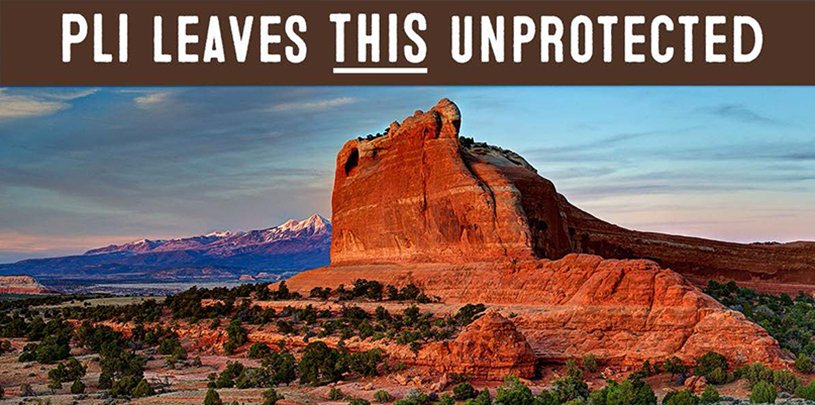
 by Tim Peterson, Utah Wildlands Director
by Tim Peterson, Utah Wildlands Director
In early 2013, the Grand Canyon Trust took advantage of what seemed to be the best opportunity in 30 years to resolve the debate over how to balance protection and development of public lands in eastern Utah. The vehicle was Rep. Rob Bishop’s, R-Utah, Utah Public Lands Initiative (PLI). We came to negotiated agreements in two counties that had the support of all parties in late 2014 and early 2015. Then the wheels began to wobble, as Bishop jerked his vehicle rightward, steering it into the ditch of obstinate anti-public lands politics.
Chairman Bishop introduced a PLI bill (H.R. 5780) in July of this year that resembles a one-off custom, full of new options and extras that roll back public lands protections. It can never pass the Congress or be signed by President Obama. What began as a promise of all sides working together to reach durable and supportable compromise now more closely resembles the famed and now-closed Mr. Toad’s Wild Ride at Disneyland.
The ride, based on the 1908 children’s classic The Wind in the Willows, began when riders boarded a jalopy (not unlike the PLI bill), in Toad Hall (a space not unlike Mr. Bishop’s House Natural Resources Committee), then proceeded to terrify and wreak havoc upon the public, crashing through a warehouse of explosives at record speed. Riders were then found guilty by a judge of mayhem before being hit head-on by a train and landing in Hades. Riders at Disneyland could exit the ride unscathed, and we hope the public will have the same chance at the end of PLI’s wild ride.
With only a handful of legislative days left in the 114th Congress and looming national elections, and even if the PLI were perfect, it would stand almost no chance of becoming law. But the PLI is far from perfect, Bishop’s last minute rush neglects to adequately vet the bill, skipping over the Subcommittee on Indian, Insular and Alaska Native Affairs, in which all bills involving Native American interests should be heard. Were that subcommittee to hear the bill, the public would learn more about how PLI seeks to transfer 100,000 acres of the Ute tribe of Utah’s Uncompahgre Reservation to the state of Utah for fossil fuel development.
Beyond the direct threat to Ute tribal sovereignty, PLI would diminish the voice of Native American tribes in management of the Bears Ears cultural landscape, encourage rampant development of dirty fossil fuels and uranium, forever prohibit sensible management of livestock grazing, and hand over public lands and public roads to the state of Utah to further their anti-public lands agenda.
On September 14, the Federal Lands Subcommittee of the House Natural Resources Committee heard testimony on PLI. Bureau of Land Management Director Neil Kornze called PLI’s provisions “unprecedented” and “problematic,” and noted that the BLM “strongly opposes” them. Ranking member Niki Tsongas, D-Mass., said: "This is not a legislative proposal that is going to be passed by the Senate or signed by the president... It could be said that this is a wolf in sheep's clothing."
When H.R. 5780 was marked up on September 22, Representative Bishop did not offer language to address the tribes’ concerns with the PLI’s inadequate collaborative management provisions for Bears Ears. He instead suggested he would make these amendments when the bill reaches the House floor, saying “the language has not been written yet,” despite having received the tribes’ proposal in October of 2015.
Representatives Raúl Grijalva, D-Ariz., Niki Tsongas, D-Mass., Jared Polis, D-Colo., and Alan Lowenthal, D-Calif., all offered sensible amendments that would have dramatically improved the bill by striking PLI’s affront to the sovereignty of the Ute tribe, rejecting the handover of public roads to the state of Utah, and bringing PLI’s state land exchange and wilderness and National Conservation Area management language in line with established law. All were rejected, mostly along party lines, by the majority of the committee. In doing so, the committee majority overruled tribal sovereignty and the American public’s interest. The bill, again along party lines, advanced out of committee, but there is little chance of action on the floor of the House in the few remaining days of this Congress’s session, let alone in the Senate.
In the end of Wind in the Willows, Mr. Toad sees the error of his ways and humbly compensates those he has wronged, leading to happiness and well-being across the land. It seems PLI faces no such redemption, but there is another path to protection. The Hopi, Zuni, Ute Mountain Ute, Navajo, and Ute tribe of Utah have come together to form an unprecedented intertribal coalition to protect a new Bears Ears National Monument. Twenty-six additional southwestern tribes and the 250+ tribes of the National Congress of American Indians support a Bears Ears National Monument as well. Broad public support has been demonstrated time and again in polling, and more than 224,000 Americans have signed petitions in support of Bears Ears. Protection is now up to the president, and we hope you will join us in support of the tribes calling on him to designate Bears Ears National Monument. We hope that soon, we’ll all be able to stroll together on a fine evening feeling the wind in the willows near Bears Ears.
80% of Arizona voters support Baaj Nwaavjo I'tah Kukveni National Monument, according to a new poll.
Read MoreUtah voters strongly support national monuments in general, and Bears Ears and Grand Staircase-Escalante in particular, a new poll shows.
Read MoreA small victory in the legal case challenging Daneros uranium mine, near Bears Ears National Monument.
Read More